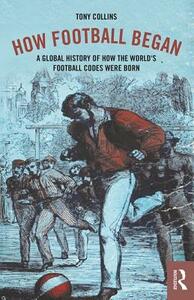Take a photo of a barcode or cover
3 reviews for:
How Football Began: A Global History of How the World's Football Codes Were Born
Tony Collins
3 reviews for:
How Football Began: A Global History of How the World's Football Codes Were Born
Tony Collins
informative
relaxing
medium-paced
Interesting history of the development of the manor types of football.
informative
reflective
slow-paced
A little less than a year ago, I became a soccer referee. Since then, I have refereed all ages from ten up to adult, in club games and high school. I love the beautiful game, but I didn't really know where it came from. After doing a little research, I found this short history. The full text of the book is available for free online here.
It covers from the beginnings of football in the mid-nineteenth century in England through the mid-twentieth century. The focus is on the early part of the history, the first fifty to seventy years. When I picked up the book, I knew about the relationship between soccer (or association football) and rugby football. But I didn't know much about how those games evolved separately into all the varieties we have now like American football, Canadian football, and Australian Rules football. This book is a great introduction to the development and relationships between all those football rules.
The writing, however, was not the best. It might be a cultural thing. This book was written and published originally in England. Regardless, I found much of the writing stilted and some of the sentence construction would just yank me out of the narrative. That said, the stories and information, including the extensive notes and bibliography, are so valuable I would highly recommend this book to anyone interested in any variety of football.
My rating: 3.5/5
I love a good historical contextualisation of the things I love the most that legitimises my love for them, and How Football Began gave me precisely that. Touching heavily upon the basis of the sport in its origin (muscular Christianity, professionalism vs amateurism, class struggle), I loved the way Collins reconstructed the evolution of football from its start, an evolution that led to the triumphant non-british working class to reappropriate what had been a symbol of British imperialism. I really enjoyed the chapter on women's football in the c19, although it feels a bit stand alonish in perspective, I think it was well-argued. However, I must add that (personally) I could have done without some of the middle chapters.


